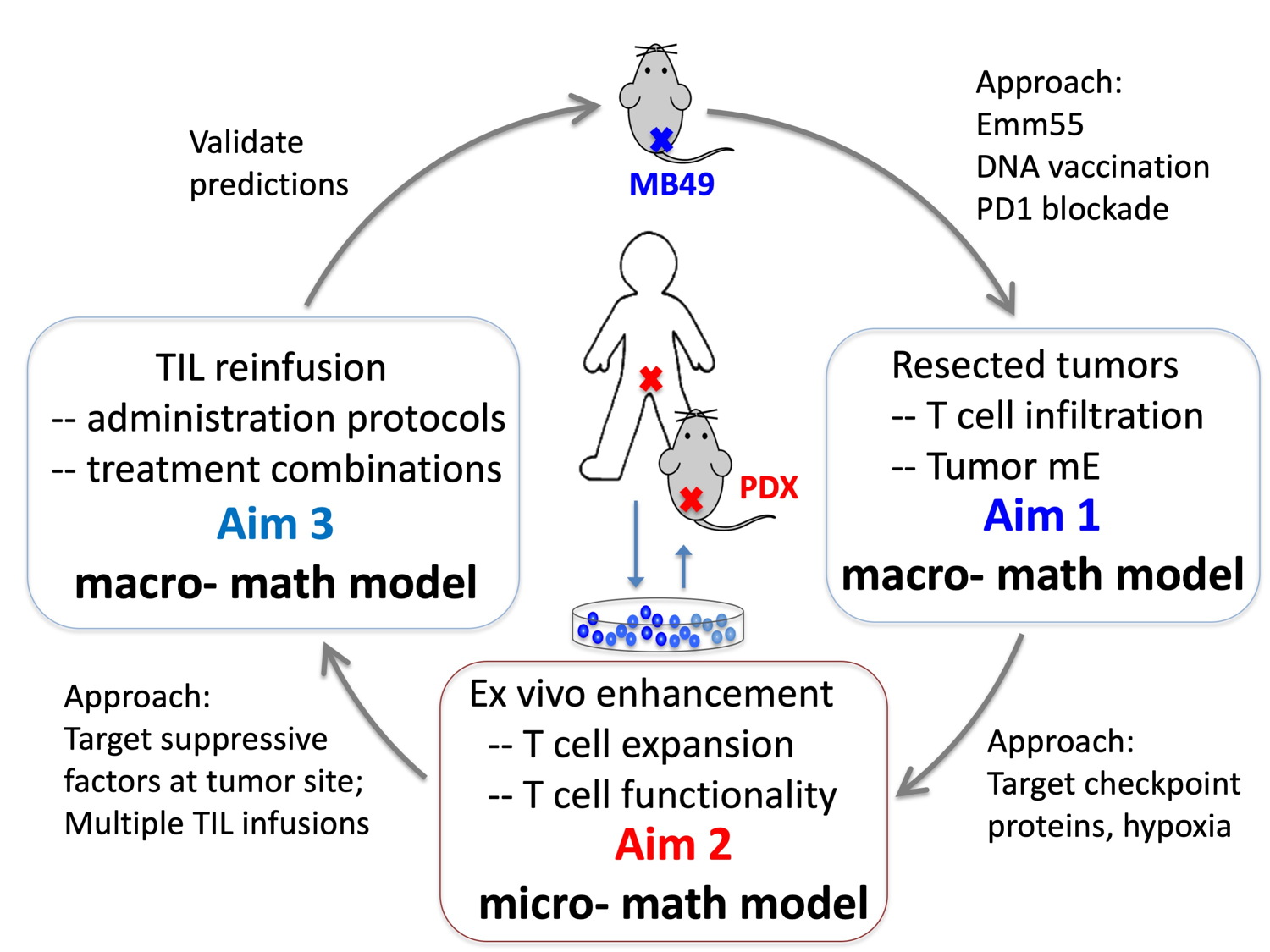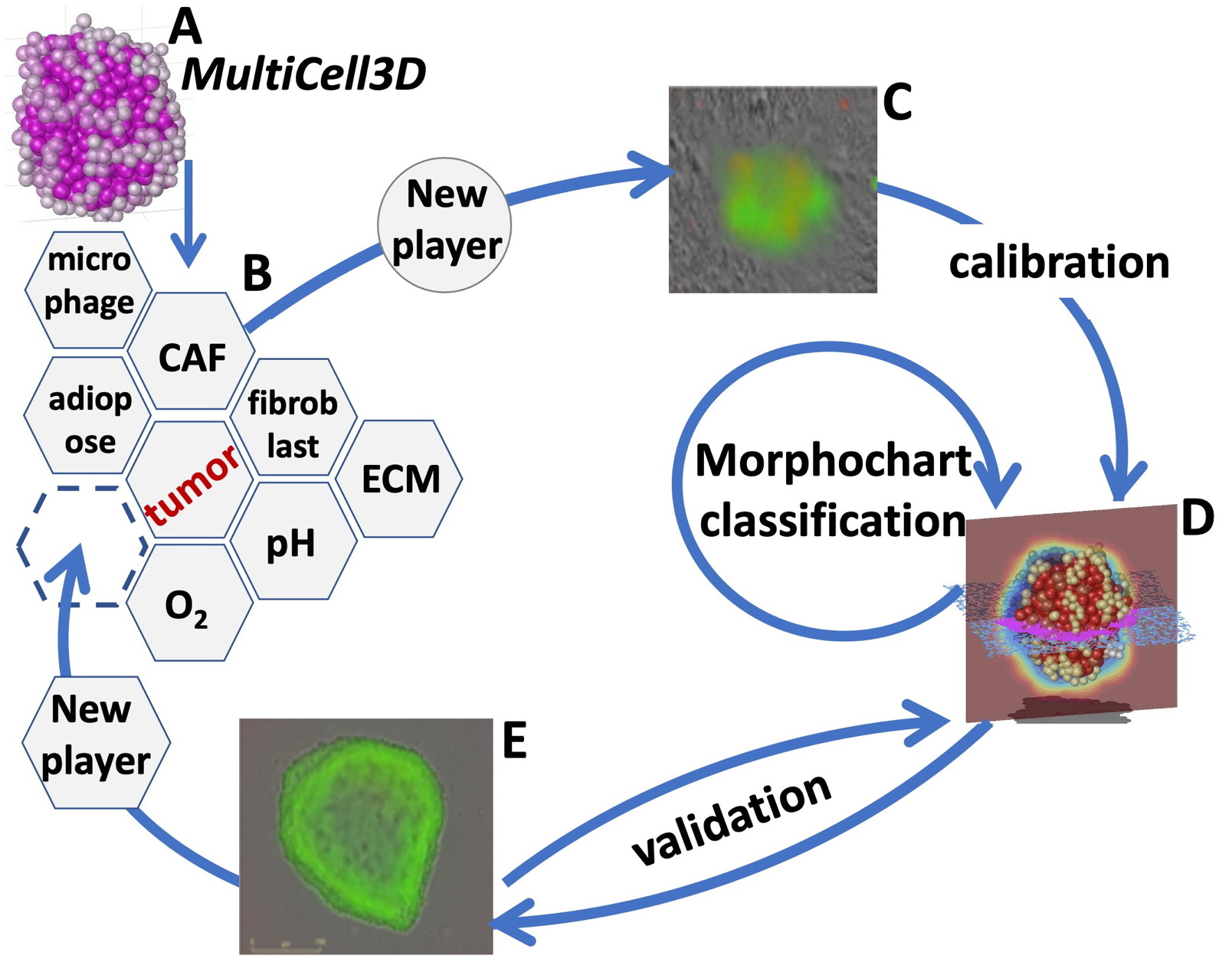Katarzyna (Kasia) A. Rejniak (PI)
Shari Pilon-Thomas (PI), Moffitt
Michael Poch (PI), Moffitt
Mehdi Damaghi (PI), Stony Brooks
*Project immuno-Oncology in bladder cancer
*Project DCIS microinvasions
*Candidate qualifications
*How to apply
Postdoctoral Research Fellow:
Postdoctoral positions are available in the computational lab
of Dr. Kasia Rejniak on NCI-funded exciting interdisciplinary projects
in metastatic cancer development or in bladder cancer immuno-oncology
treatments.
The position can be filled immediately.
The funded projects will be performed in close collaboration with
cancer biologists, immunologists, and clinicians.
(1) "Mathematical Model-Guided Adoptive Immunotherapy in
Bladder Cancer" in collaboration with labs of
Dr. Shari Pilon-Thomas and Dr. Michael Poch.
The adoptive immunotherapy with intravesical
delivery of autologous tumor-infiltrating T lymphocytes (TIL) has the
potential to improve clinical outcomes in patients with bladder cancer.
The adoptive immunotherapy has three main phases:
- the autologous tumor infiltrating lymphocytes (TILs) must be able
to infiltrate the tumor;
- after tumor resection, T cells must be expanded and activated
ex vivo;
- the expanded T cells must be reinfused into the cancer patient
to exert effect on tumor. We will use mathematical modelling and
simulation studies to optimize each of the three phases.

We will (1) develop and validate an in silico model to enhance T cell infiltration into the bladder tumor; (2) predict in silico and validate in PDX models the methods to enhance T cell functionality; (3) optimize and validate combination schedules of adoptive T cell therapy in teh bladder cancer.
The adoptive immunotherapy has three main phases:
- the autologous tumor infiltrating lymphocytes (TILs) must be able to infiltrate the tumor;
- after tumor resection, T cells must be expanded and activated ex vivo;
- the expanded T cells must be reinfused into the cancer patient to exert effect on tumor. We will use mathematical modelling and simulation studies to optimize each of the three phases.

(2) "Modeling the Role and Regulation of Reactive Stroma
in Breast Ductal Carcinoma Microinvasions" in collaboration
with Dr. Mehdi Damaghi.
The first step in upstaging of ductal carcinoma
in situ (DCIS) to invasive ductal carcinoma (IDC) is manifested as
microinvasions, that is cohorts of cells that breach the basement membrane
and penetrate into the surrounding tissue. Our goal is to test whether
emergence of reactive stroma is a pre-requisite for initiation of microinvasions
and involves metabolic reprogramming of stromal cells.
We will develop an integrated computational-experimental approach to
(i) stratify the impact of tumor-derived metabolic conditions on
stromal activation; (ii) assess the role of reactive stroma in
promoting microinvasions in DCIS; and (iii) evaluate reactive
stroma signatures in DCIS histology.

The mathematical and computational methods used by our lab include
the microscopic (ABM) and macroscopic (ODEs) in silico models
supported by in vitro, in vivo, and ex vivo data, and quantitative
analyses of histology and multiplex fluorescent images.
The Ideal Candidate will have:
- experience in mathematical or computational methods for modeling
biological systems (ODEs, PDEs, ABMs, and/or machine learning), with
a preference for those with knowledge of cancer,
- high motivation and enthusiasm for working in an interdisciplinary
team,
- demonstrated creativity and ability to work independently and within
the group,
- strong programming skills (i.e., Matlab, C/C++, Java, Python, R) for
modeling and data analysis.
Rejniak Lab is a part of the
Integrated Mathematical Oncology Department at the H. Lee Moffitt Cancer
Center and Research Institute in Tampa, Florida.
How to Apply:
Interested applicants should send a single PDF file to
Dr. Kasia Rejniak at
Kasia.Rejniak@moffitt.org
that includes:
(1) a cover letter summarizing their research training and
accomplishments,
(2) a personal statement of scientific interests and goals,
(3) current CV with a list of research presentations and publications, and
(4) contact information for three references,
and apply online (job number 62177)
here: on Moffitt job website.

- experience in mathematical or computational methods for modeling biological systems (ODEs, PDEs, ABMs, and/or machine learning), with a preference for those with knowledge of cancer,
- high motivation and enthusiasm for working in an interdisciplinary team,
- demonstrated creativity and ability to work independently and within the group,
- strong programming skills (i.e., Matlab, C/C++, Java, Python, R) for modeling and data analysis.
(1) a cover letter summarizing their research training and accomplishments,
(2) a personal statement of scientific interests and goals,
(3) current CV with a list of research presentations and publications, and
(4) contact information for three references,
and apply online (job number 62177) here: on Moffitt job website.